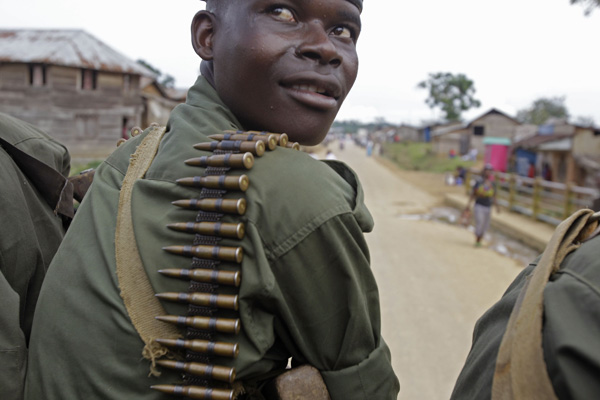
The U.S. Department of Treasury recently announced the addition of two high-level M23 leaders, Eric Badege and Jean-Marie Runiga Lugerero, to its list of specially designated nationals, or SDN, already sanctioned by the U.S. government for their involvement in the rebellion rocking eastern Congo. As a result of the Treasury Department’s designation, in addition to being prohibited from travelling internationally and having their assets frozen under U.N. sanctions, Badega and Runiga are cut off from trade with any U.S. persons or entities, potentially circumscribing their operations, which are financed by the minerals trade.
At the end of last year, the U.N. Security Council strongly condemned the March 23 Movement, or M23, for attacks on the civilian population of eastern Congo. In Security Council Resolution 2078, the U.N. also expressed its intention to consider additional targeted sanctions against M23 leadership. On December 31, 2012, the Security Council Sanctions Committee announced sanctions against Badega and Runiga and confirmed an arms embargo against M23 and the FDLR broadly. Relying on a U.N. Group of Experts report outlining human rights violations committed by Badege and Runiga, the U.N. Security Council’s Sanctions Committee specifically cited instances of murder, maiming, and rape, committed or encouraged by Badege, against women and children, as one of its central reasons for imposing sanctions.
The Group of Experts also found that by the end of 2012, Badege had become a prominent commander within the M23 forces operating in North Kivu and was conducting damaging coordinated attacks that “enabled M23 to destabilize a considerable part of Masisi territory” in eastern Congo. Additionally, in a report issued by Human Rights Watch Badege and Runiga are held partially responsible for M23’s recruitment of child soldiers and the execution of these children following attempts to flee. As the president and political leader of M23, Runiga has command responsibility for the atrocities being committed by his organization. The M23 is accused of human rights violations, including sexual violence, abduction, forced recruitment of child soldiers, and forced displacement of civilian populations.
The actions taken by the Treasury Department are consistent with a long pattern of U.S. cooperation and collaboration with the U.N. Sanctions Committee and are a strong demonstration of support for the international community’s continued effort to end human rights violations and crimes against humanity in eastern Congo. “We believe these designations will directly help advance the goal of sustainable peace in eastern [Congo],” stated U.S. ambassador to the United Nations Susan Rice.
Runiga fired back at the U.N. concerning the findings of the Group of Experts report issued on M23 leadership. He claimed that both the U.N. and the HRW reports were “politicized” and “erroneous,” arguing that biased rapporteurs had manipulated the United Nations. Runiga also called on U.N. Secretary-General Ban Ki-moon to order a new inquiry in eastern Congo, "carried out by people of moral integrity and salubrious intellect."
The Treasury Department’s decision to add Badege and Runiga to the SDN list is an important step forward in the broader effort to weaken M23’s campaign in eastern Congo and one that must be pursued further up the group’s chain of command. The restriction of potential trade avenues of M23 strengthens the fight to mitigate the group’s resources and, as a result, their ability to use those resources to continue undermining peace and stability in the region.
Photo: A Congolese soldier (AP)
Related Stories:

